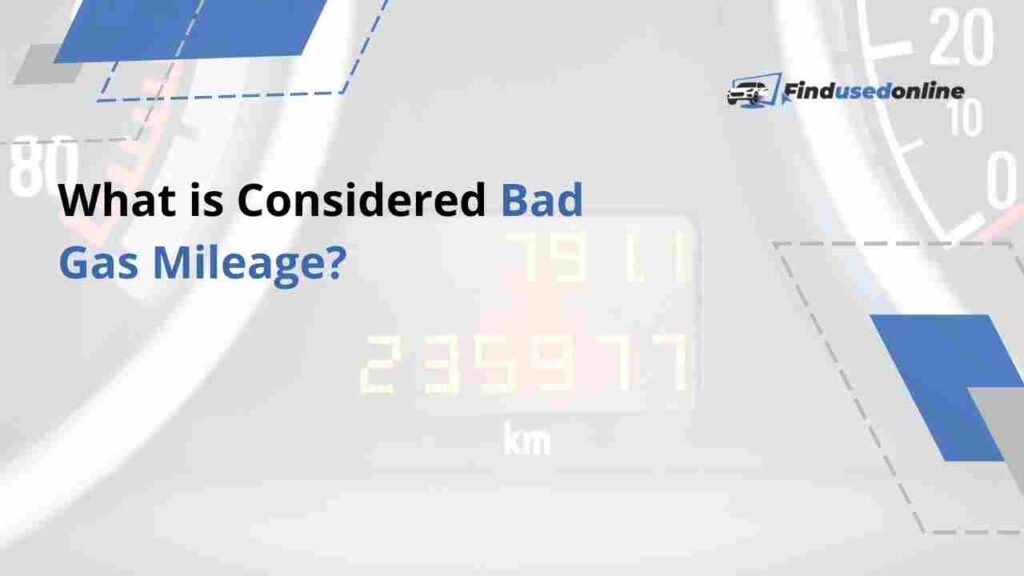Gas mileage, often expressed as miles per gallon (MPG), is one of the most critical factors to evaluate when purchasing a vehicle. It impacts not only your wallet but also the environment.
Understanding what constitutes bad gas mileage can help you make informed decisions as a car buyer and ensure you’re getting the best value for your investment.
RELATED: Why a Mileage Check is Crucial When Buying a Used Car
Understanding Gas Mileage
Gas mileage measures how far a vehicle can travel on a gallon of fuel. It is typically divided into two categories:
- City MPG: Represents fuel efficiency in stop-and-go traffic and urban conditions.
- Highway MPG: Indicates efficiency during steady-speed driving on open roads.
Knowing a car’s MPG is essential for budgeting fuel costs and reducing your carbon footprint. It also helps compare vehicles and choose the most efficient option for your needs.
What is Considered Bad Gas Mileage?
Bad gas mileage varies depending on the type of vehicle. Here’s a breakdown of general benchmarks:
Compact Cars
Compact cars are known for their fuel efficiency.
- Typical MPG: 25–35 MPG.
- Bad Gas Mileage: Anything under 20 MPG is generally considered poor for a compact car, as it defeats their primary appeal of economical fuel use.
Sedans and Midsize Cars
Sedans offer a balance of space and efficiency.
- Typical MPG: 20–30 MPG.
- Bad Gas Mileage: Below 18 MPG is considered poor, especially for newer models equipped with modern fuel-saving technology.
SUVs and Trucks
Larger vehicles consume more fuel due to their size and power.
- Typical MPG: 15–25 MPG.
- Bad Gas Mileage: Less than 14 MPG is often deemed poor, particularly for smaller SUVs or light-duty trucks.
Hybrids and Electric Vehicles
Hybrids and EVs use innovative technology for efficiency.
- Typical Efficiency: Hybrids achieve 40+ MPG, while EVs use miles per kilowatt-hour (kWh) as a metric.
- Bad Gas Mileage: For hybrids, anything under 30 MPG is subpar. For EVs, fewer than 3 miles per kWh can indicate inefficiency.
Factors Influencing Gas Mileage
Several factors can impact a vehicle’s fuel efficiency:
- Engine Size and Type: Larger engines or those with older technology tend to consume more fuel. Turbocharged engines, when driven aggressively, may also reduce MPG.
- Driving Habits: Hard acceleration, speeding, and frequent idling can significantly decrease fuel economy.
- Vehicle Maintenance: Poorly maintained cars, especially those with dirty air filters or misaligned wheels, may have reduced MPG.
- Load and Towing Capacity: Carrying heavy loads or towing trailers can strain the engine and lower fuel efficiency.
- Terrain and Weather Conditions: Driving on hilly terrain or in extreme weather often requires more fuel.
RELATED: How to Find the Complete Service History of Your Car
Why Bad Gas Mileage Matters
Cost of Fuel and Ownership
Vehicles with poor MPG lead to higher fuel costs, increasing the total cost of ownership. For drivers who commute long distances, even small differences in MPG can add up over time.
Environmental Impact
Gas-guzzling vehicles contribute more greenhouse gas emissions, exacerbating climate change. Opting for fuel-efficient cars is a small but significant step toward sustainability.
Resale Value
Fuel efficiency is a major selling point in the used car market. Cars with bad gas mileage may fetch lower resale prices, as buyers often prioritize economical options.
Tips for Evaluating Gas Mileage in Used Cars
If you’re considering a used car, here’s how to assess its gas mileage effectively:
- Research Manufacturer Specifications: Check the official MPG ratings for the make and model to understand its expected performance.
- Check Vehicle History Reports: You can use our reliable VIN check tool to gain insights into past mileage records, helping you gauge real-world efficiency.
- Ask About Maintenance Records: Regular tune-ups and proper care can prevent fuel inefficiency. Be wary of vehicles with spotty maintenance histories.
- Test Drive and Observe: During a test drive, note the vehicle’s response, especially in stop-and-go traffic or uphill climbs. A sluggish engine might indicate inefficiency.
RELATED: What is the Best Site To Check the VIN Number
Conclusion
Gas mileage plays a vital role in determining a vehicle’s value and practicality. Poor fuel efficiency can increase ownership costs, harm the environment, and reduce resale value. By understanding what constitutes bad gas mileage and the factors influencing it, you can make smarter decisions when purchasing a car. Use tools like vehicle history reports and manufacturer data to ensure you’re choosing a vehicle that aligns with your needs and budget.
Frequently Asked Questions
What is the average gas mileage for new cars today?
The average gas mileage for new cars is around 24–32 MPG, with hybrids and EVs offering significantly higher efficiencies.
Can bad gas mileage be improved?
Yes! Simple steps like regular maintenance, avoiding aggressive driving, and reducing excess weight can help improve gas mileage.
How does bad gas mileage affect the environment?
Vehicles with low MPG emit more carbon dioxide and other pollutants, contributing to global warming and air quality degradation.


